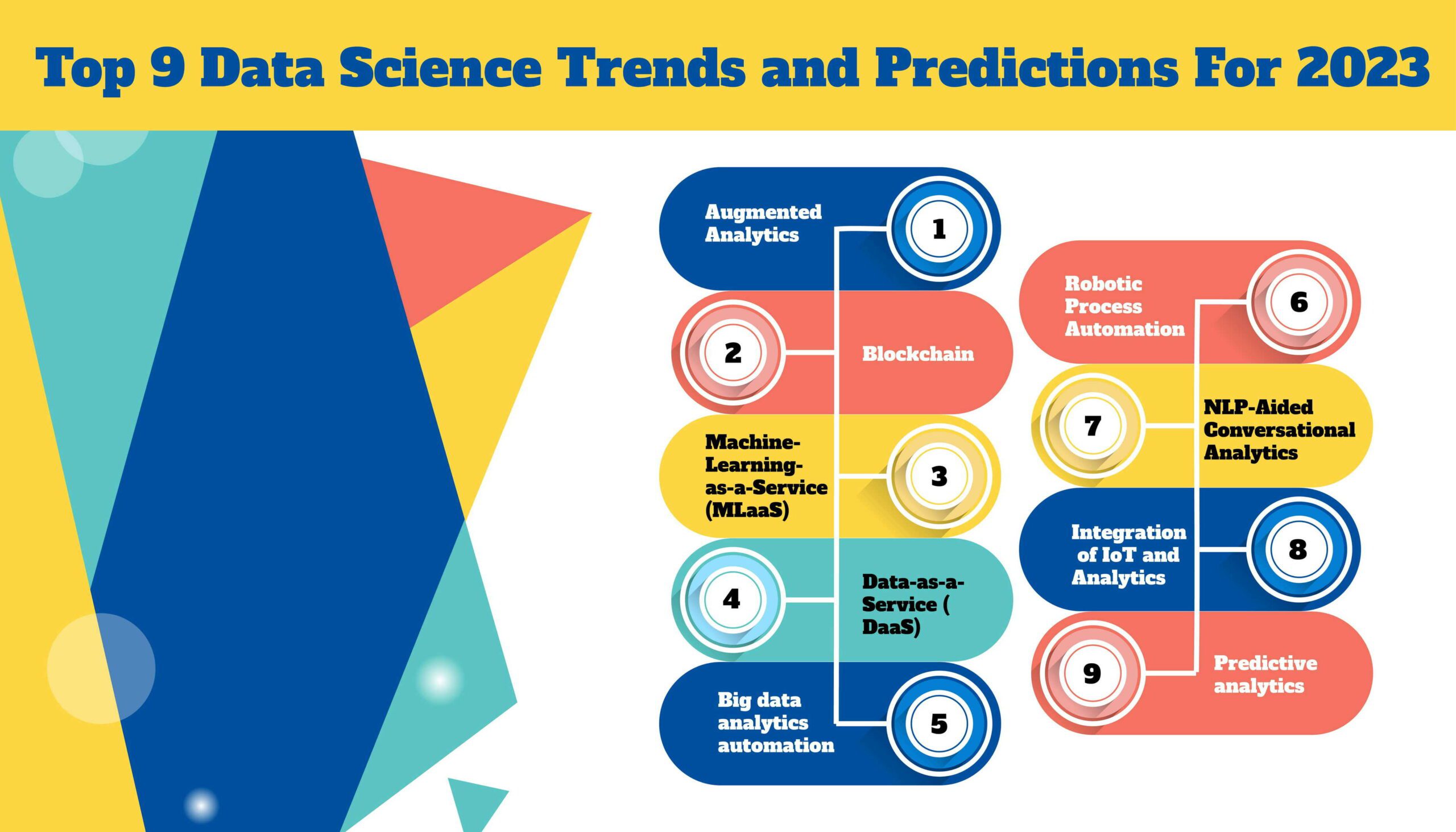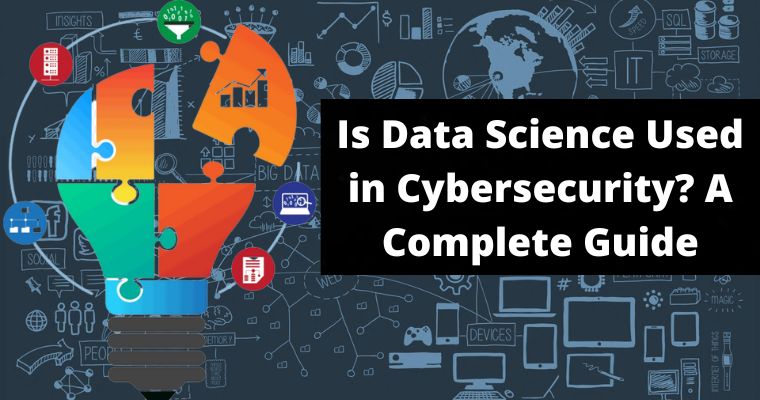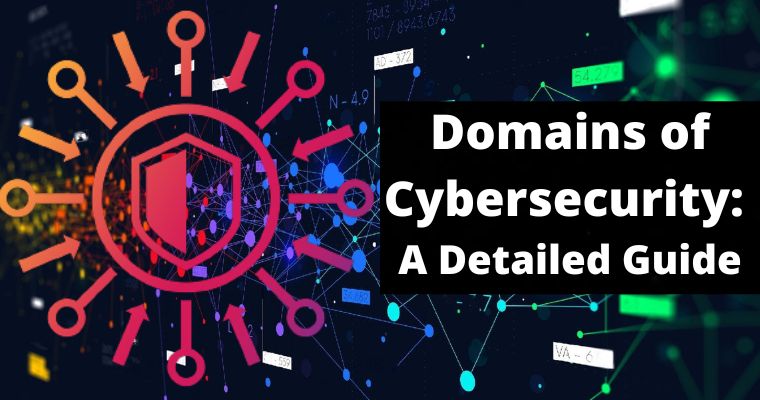In a world where cyberattacks are constantly increasing in frequency, severity, and sophistication, cybersecurity professionals need to start thinking about how they can combat these threats.
The field of data science is becoming more important every day as it provides new insights into the behavior of attackers and malware.
In this article, we’ll discuss what data scientists do for security, why it’s useful for security organizations to have them on their team, and how you can get started with data science if you’re not already doing so.
Table of Contents
What is Data Science for Cybersecurity?
In data science, machine learning algorithms are used to detect or prevent security threats.
For example, a machine learning algorithm could be used to determine whether a specific file on the corporate network is behaving in an unexpected manner and indicate that it’s time to investigate further.
The process of creating these algorithms and using them is called “data science” because you’re using data (e.g., network traffic logs) as your source of information and rely on statistical techniques to understand what’s going on (i.e., conduct research).
Once you’ve analyzed the data, patterns begin to emerge where some types of malicious behavior can be identified more quickly than others – this is where deep learning comes in.
Deep learning is a specific subset of machine learning that uses multiple layers of unsupervised information processing to learn things about data that you don’t directly tell it.
The majority of security professionals in the field today will be familiar with cybersecurity-related terms such as “threat intelligence,” “attack surface analysis,” and “risk assessments.”
Although these topics are crucial for dealing with cyber threats, they do not specifically deal with handling them – at least not yet.
The reason behind this is that threat intelligence mainly involves gathering information on past attacks and attackers, whereas deep learning detects patterns within data without prior knowledge or human input.
In order to get from data to actionable insights, you must be aware of what data you’re exposing yourself.
The Importance of Data Science in Cybersecurity Attacks are constantly evolving, and so are your organization’s security controls.
Attackers don’t just use one specific way to breach the systems that they target; instead, they continuously innovate to find new ways to carry out their objectives.
While it’s possible for an IT admin to predict if a particular system has low risk, the chances of detecting malicious activity across all devices on your network are slim-to-none because there may be thousands or even millions of them!
Therefore, detecting potential cyber threats becomes extremely important when considering how much effort is needed for protecting each asset.
Furthermore, some attackers gain access by exploiting vulnerabilities in systems, while others do so by tricking the users of the systems into performing actions that they otherwise wouldn’t.
This means it’s essential to monitor not only what applications are being used but also how users interact with them.
Data Science vs. Machine Learning on the Job Market If data science interests you, you might have noticed an influx in job postings online for “machine learning engineer” or “machine learning developer.”
You don’t necessarily need to be a data scientist if you want to work in cybersecurity – but having knowledge of machine learning techniques will definitely help!
According to Indeed, there were over 6,000 jobs posted online related to machine learning back in 2016, whereas today, there are more than 8,700!
These numbers do not even include deep learning-related positions because the term “deep learning” is relatively new in comparison to “machine learning.”
Top 9 Data Science Trends and Predictions For 2023

- Augmented Analytics
- Blockchain
- Machine-Learning-as-a-Service (MLaaS)
- Data-as-a-Service (DaaS)
- Big data analytics automation
- Robotic Process Automation
- NLP-Aided Conversational Analytics
- Integration of IoT and Analytics
- Predictive analytics
Cybersecurity before Data Science
Companies like to talk about how much they value data science and analytic rigor in making decisions. Business leaders tend to view the process as unbiased and rational and therefore assume their staff can be trusted with these insights.
Yet often those who receive this information don’t take it seriously or follow through on its implications because they misunderstand why their company collects big data in the first place.
They assume that machine learning algorithms are as objective as a ballistics report from the forensics lab, when in fact the output is only as good as the inputs.
The best way for companies to use data scientists’ expensive skillset is to ensure that the data science product is robust from the start, rather than trying to clean up spurious results.
In cyber defense, this means partnering with IT security staff early in the design process and ensuring that the attack surface will be well-covered by cybersecurity controls.
Spend a little time getting a better understanding of their needs instead of blindly trusting your security vendor’s sales pitch to deliver “breach detection” for all your databases.
Take a look at what kinds of false positives pop up when you run a training set through their system and try to find ways around that.
If you can help them build something that will work without constant tweaks by people who understand the technology, they’ll be much more likely to use it. In turn, you’re much less likely to get your fingerprints on another company’s data breach.
What do Data Science Security Professionals Do?
In order to deal with cyber threats, security professionals should know how to handle them from the data they’re exposed to. Data scientists use machine learning to turn data into actionable insights, and this is where deep understanding comes in.
Stay tuned for our next article – we’ll be exploring how deep learning can protect your organization’s systems!
The Importance of Data Science in Cybersecurity in Today’s Society
Our online lives are constantly at stake due to the growing sophistication of cyberattacks. These attacks can take place through all possible mediums, ranging from laptops and cell phones to home appliances such as smart speakers or fridges.
As technology advances, so do the opportunities for hackers. When people think about cybersecurity, they often imagine how an IT administrator would deal with specific threats
However, there is much more than meets the eye when it comes to handling cyber threats that involve data science!
If you are interested in becoming a data scientist, it’s essential to understand what the profession entails.
According to Google Trends, interest in “data science” has been steadily increasing over the years, whereas interest in “machine learning” is growing exponentially!
Data scientists work on using machine learning techniques to turn data into actionable insights which can be used for cybersecurity purposes.
These professionals either use pre-existing models or build their own based on the data that they’re exposed to.
This data could be anything ranging from existing malware samples to user behavior analytics.
When it comes down to it, security teams need their hands held when dealing with cyber threats – and deep learning can help them!
Stay tuned for our next article, where we will be discussing deep learning and how it can help your organization’s systems!
Cybersecurity careers are definitely on the rise, so if you’re looking for a job, it might be time to start brushing up on machine learning! Can you explain how deep learning works? Let us know in the comments below.
Future of Data Science in the realm of Cybersecurity
At the Future of Cybersecurity panel at Data Science Day, MIT’s David Harrigfeld said that data science stands to have a significant impact on an organization’s ability to reduce risk. “If you can’t measure something, you can’t understand it,” he said.
He warned that the security industry is constrained by static thinking and inadequate tools. When asked about how data science is involved in cybersecurity, Harrigfeld replied:
“It’s not just using new data sources—it’s managing them in ways you’ve never thought before.”
Data Science for Security is one of the most prominent applications, explained Chris Wysopal, co-founder and CTO of Veracode Inc., because hackers are constantly evolving their tactics to get around the elusive goal of a 100% secure system.
“You cannot build a secure system,” he warned, and instead must secure a system that is constantly evolving and changing.
The challenge in security is understanding what data could be beneficial to collect—and how to use it efficiently, said Harrigfeld.
This means building better detection systems, which requires new ways of thinking about getting the data to detect threats.
Data science provides better insights into user behavior by using patterns such as mobility and social graphs to predict anomalous behavior, said Edward W. Felten, Professor, and Director of Princeton’s Center for Information Technology Policy (CITP).
He explained that people are predictable most of the time, but not all the time. Analytics is crucial to understanding what’s normal and abnormal.
“Analytics can find anomalies that humans can’t see,” he said, adding that you need the suitable algorithms to do it effectively.
Ms. Li Zhou, Principal Data Scientist with Booz Allen Hamilton Holding Corp., explained that a different focus depends on the industry.
The cybersecurity field has an abridged timeline, so decision-makers now want indicators of potential problems without spending months building models.
On the other hand, in healthcare, for example, they have the luxury of time to build better predictive models and invest more resources into improving them. “You really need painstaking academic research if you’re trying to predict rare events,” she added.
Data Science for Automation
One of the most important things that can be done with data science is to automate all the repetitive tasks that humans are currently doing, said Harrigfeld. “The human decision-maker needs to be in control, not computer systems.”
Having computers automatically make decisions doesn’t work because there are too many false positives—it’s still up to humans to determine what is a real threat and what isn’t, said Wysopal.
Data science is essential for security automation because it allows you to assess trends quickly, said Galen Hunt, Principal Data Scientist with Microsoft Corp., adding that the number of things you need to evaluate just keeps growing—and your assessment needs must grow as fast as the volume of data.
Data Science for All
“It’s a space where you can apply data science to any industry,” asserted Harrigfeld. Data science is relevant to all businesses because it allows companies to gain insight from their data, said Wysopal.
“If I told you that your sales were declining and then asked what you are doing about it, you’d want to know why they are declining,” he said. Data science allows companies to get the insights they need in order to take action.
“All of us have a deep yearning for making sense of our data,” asserted Wysopal. He added that building tools that help humans understand their data better are essential things that can be done with data science.
“I think we’re just scratching the surface on what we can do.”
Felten agreed. He said: “It’s all about understanding and explaining data—and building tools for humans to use.”
Data Science in Cybersecurity to protect our digital footprints from prying eyes
Hacking is no longer the exclusive territory of elite governments or national militaries. Criminals, internet hackers, and other less-than-honorable types are all on the lookout for digital access points through which they may exploit your data.
Cyberattacks, data breaches, identity theft, and more are on the rise. Information is freely accessible to everyone; thus, criminals covet it as much as they do.
Hackers seek every opportunity to exploit usernames and passwords for various online services in order to gain unlawful access to our personal information like bank accounts and credit card numbers that we store with those companies (health insurance).
However, traces of our digital activities do not wash away with the tide; they endure forever. New data is stored as a result of each action, interaction, and click on your website.
Businesses use the data points to create better products, make smarter decisions, and automate tedious tasks.
In parallel, organizations are being assaulted by a diverse range of hackers seeking to steal sensitive information and disrupt operations, all while under heavy assault from increasingly sophisticated cybercriminals.
So, they’re taking appropriate measures to repel these assaults, getting better at protecting their data, and seeking methods to keep the hackers at bay.
Three reasons why businesses are increasingly utilizing data science are discussed below
- More effectively providing goods and services: Because big data refers to data sets so enormous, diverse, and proliferating that conventional methods of dealing with data and their processing applications can’t produce any substance – or insight, it’s called “big data.”
- Knowledge extraction is the process of extracting knowledge from data. Data science enables practical, actionable insights by extracting knowledge. Calculating and monitoring these metrics can enhance efficiency, mitigate risks, improve user experiences, and make inventory more agile.
- Convenience: This is a compelling benefit that has been argued to outweigh the disadvantages.
- The reason for this is that mining and analyzing, filtering, and sharing crucial data sets allows businesses to make more informed choices than they ever could have done previously.
- Automating routine, time-consuming processes: Data scientists are making a lot of technical parts of the job more accessible with the aid of data science, AI, and machine learning.
- A machine-learning algorithm may, for example, automate decision-making abilities and knowledge that require iteration – such as pricing, cost structure, loan decisions, risk assessment –
Here are four reasons why cybersecurity-related activities are so crucial to businesses, and every owner must consider them!
- The cost of breaches is on the rise: as cybercriminals escalate their assaults on businesses of all sizes, information security incidents continue to increase.
- According to Cybersecurity Ventures, research, and publishing firm specializing in the global cyber economy, cybercrime will cost the globe $6.2 trillion every year by 2021, up from $3.7 trillion in 2017.
- A data breach not only wreaks havoc on a business’s finances but it also damages its reputation. To avoid data breaches, firms must follow best practices to prevent losing confidential and sensitive information.
- Advanced cyberattacks: They target IT networks of host organizations using known security flaws in Internet-facing systems. Given this, businesses are putting in additional security measures to detect complex crimes.
- The availability of hacking tools and knowledge to carry out attacks has resulted in a significant increase in successful hacks.
- Internal actors, who are frequently less skilled, can often successfully penetrate due to the high availability of hacking tools and skills.
- Companies are developing a solid internal security system by implementing internal security compliance and receiving adequate instruction and training.
- The Proliferation of Internet of Things (IoT) Devices: There are more devices connected to the internet than ever before.
- According to the most recent IoT Analytics Research, active and connected IoT devices will rise from 11 billion in 2020 to 23 billion in 2025. Companies are increasingly aware of the risks and challenges that joined devices and networks in the IoT pose.
Data Science for Cybersecurity: The Road Ahead
Data science is not only the future of cybersecurity but also the present. Companies are hiring data scientists to help protect their customers and products from malicious hackers.
Companies in every industry need to invest in this new field before they’re targeted or experience a breach that would cripple them financially.
Now, startups with new technology are providing services to companies to adopt innovative strategies by providing an expert team of professionals who specialize in
- Security consulting services
- Cyber risk management strategy development
- Business continuity planning (BCP)
- Network attack simulation modeling
- Training programs
They even provide you with their proprietary software solutions which can be helpful today to ensure tomorrow’s success, in a better way.


